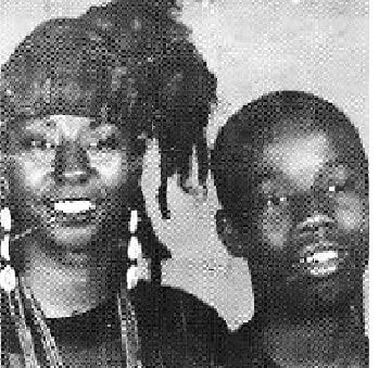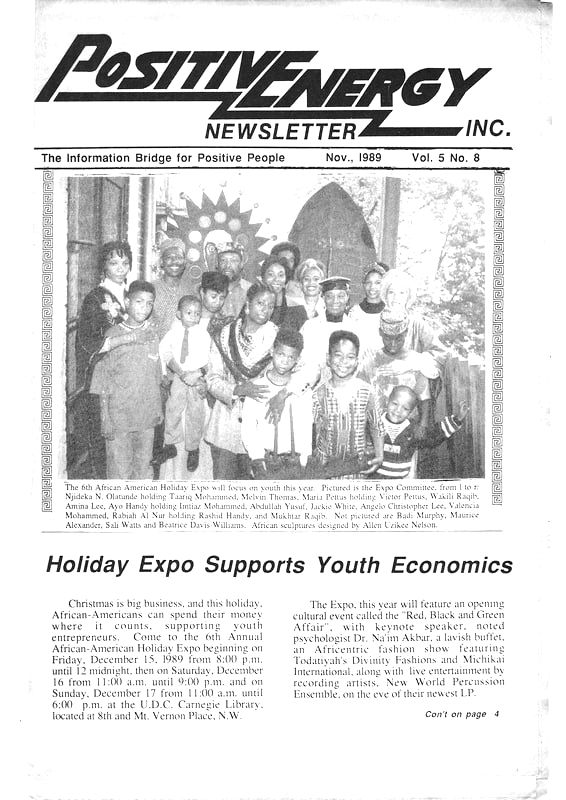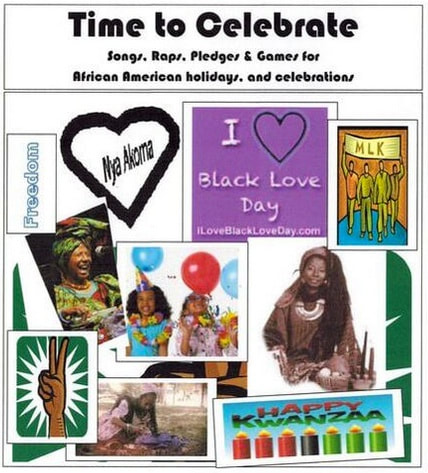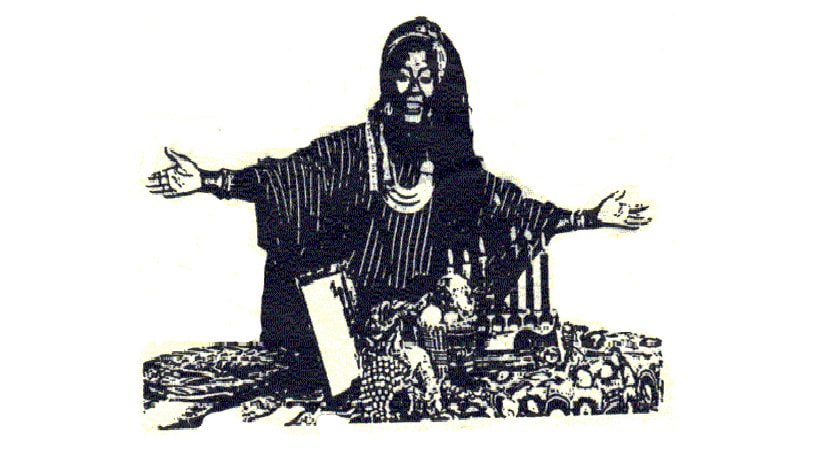|
CONTINUED FROM HOME PAGE...... This event evolved also into a non-profit organization, The African-American Holiday Association (AAHA) and was the fore-runner of many African-American market-places that encouraged shoppers around the time of Christmas and Kwanzaa to "buy Black". This concept advocated the goal of bringing back needed dollars into the Black community to circulate them among Black people compared to other communities that spend with each other.. This fundamental principle of "self-determination" to empower a community that see's most of their money circulating outside of their community enables job creation, wealth building and economic self-help, which occurs in other communities, using our Black dollars. Our 2nd goal of the Expo was to raise our youth to self-sufficiency" with the understanding of entrepreneurship. Sponsored by my non-profit, African American Holiday Association (AAHA) we offered youthpreneurs' vending spaces at a very low fee as well as offered scholarships and hired young people as assistants. In those years we operated self-sufficiently also, getting only one small government grant, and some sponsorship from local businesses. The rest came from fundraising with the attendees who donated to the program and the merchants who vended. We recycled these funds to support over 5,000 young people, in the 10 years of a program we called Y.EP. (Youth Entrepreneur Program). All of the youth in this picture below were in the core group of YEP, of which several continue today to use their skills as business and family leaders . While several of these youth, - my son Rashid and Sister Valencia's son Imtiaz became Ancestors early in their life, we believe they learned a lot from YEP . And the adults in the picture, who are also Ancestors - my brother Melvin and Brother Wakili - along with all of the other core members at that time of the Expo, sacrificed time, money and effort because they truly believed in raising up a generation of self-sufficient youth, whose ability to stand on their own two feet would enable them to be self-determined in this world. I.m very proud of this legacy.. I still see the "fruits of our labor". Several youthpreneurs are involved in businesses of their own or in leadership positions, today. I know that Christopher Lee in the picture, not only was the first in his famiiy to complete college, then he went on to become a director at Meharry Medical College, a HBCU in Nashville. Mukhtar, also in the picture, recently shared with his Mom, Valencia Mohammed, "that one of his most memorable experiences as a young boy was working at the Expo". He grew up to also attend college, majoring in business and is instrumental in the business founded by his Mother, the successful M.E, a business that advocates for cannabis access, justice and it's wellness and sustainability for economic and business self-help. Not in the picture, is Zaki Rasheed, who imported African clothes at an early age like 7 or 8 maybe, who came into YEP and vended for years, then continued to import after he outgrew the Expo, opening up his own stand as a young man,. Now, his leadership skills learned from those day, still show up as a teacher and administrator at the Kuumba Learning Center in D.C's S.E. side, created by his Mom, Mama Maja Rasheed, who started a day care center for " special children " now over 37 years old, and a private school for african-centered learning focusing on the arts.  Rashid Handy, my son, who saw some vendors struggling to bring in their items into the Expo and suggested that the youth could earn money by helping them as vendor assistants. His vision became the foundation of the Youth Entrepreneur Program (YEP) Rashid served in YEP and helped develop it for 5 years until he was attacked and taken at age 17 on the streets of D.C. His legacy also lives on as I have breathed with millions because of him.. These are just some of the success stories and there are many more. The Expo left a legacy of self-determination because of it's YEP initiative, of which I am most proud of. But, we also spawned a number of entrepreneur marketplace replicas, which also enabled our community to gain self-determination and thereby self-sufficiency. We consulted with Brother Baruch about his desire to start an Expo which he hosted for several years, and next thing, he had a health-food store, then restaurants, and today, has several in D.C and Maryland.called Every-Lasting Life and E-Life. We consulted with Juanita Britton, giving her consultation and a vendors list, and she became founder of the BZB International Art and Gift Show, which is now going into its 29 year. in D.C We consulted with Duron Chavous, founder, of Happily Natural Day in Richmond, Virginia, now going into it's 18th year; the,holiday craft show at Jacob Javitz Center in N.Y; and with Lee Greene founder of the Black Expo, U.S.A., that started in D.C., that went national and with Sala Damali' big vision of IBBMEC, the International Black Buyers Manufacturers Expo and Conference. Years after the Expo ended, we still consulted with festivals, gift shows, marketplaces and entrepreneur ventures, like Kymone Freeman's, "Black Love Day Festival"; festivals held by One Common Unity; and several hair shows. The list of consultations we offered to start and evolve, "do for self, buy black businesses" go on and on. In addition, many of the merchants who got their start, vending at the Expo, year after year, became successful store owners, opened retail outlets, and created businesses in which they helped grow their families into entrepreneurship self-determination. Brother Hodari Ali developer of Pyramid Bookstore, grew from a vending business to own 4 bookstores, before his passing. His legacy is being carried on by son, Haziq Ali who is a businessman and motivator of entrepreneurship. Barbara and Ollie Collier creators of Food for Life catering business, continued years after the Expo's long lines of serving delicious fish and tofu cuisine. They have passed their catering business to their daughters, who used to work with them at the Expo., while today are P.E.W. affiliates with Kangen Water systems. Sala Damali and husband Alex Medley, proprietors of a greeting card enterprise, Kuumba Kollectibles and IBBMEC, also would have their children helping at the Expo, and today they all work for themselves and help with their families printing business. Brother Aria LaTham introduced his SoulFired food concept at the Expo, and now has gone international, sharing his plant-based menus and offering retreats in Jamaica. Again, I could go on and on to speak of the merchant success stories that came out of the African-American Hoiday Expo. ,But the Expo was more than a "gift show" - it was a 360 degree family, community and cultural affair to lift up and expose the high values of afrocentrism, creativity, Kwanzaa and self-sufficiency, as an alternative to the commercialism of Christmas. We provided a platform for many up and coming D.MV. local presenters, authors, spokespersons and healers, who have since gone on to fame on the world stage - Iyanla Vazant, Julianne Malveau, silver-medalist, Jair Lynch and his father, historian Acklyn Lynch; performers Ayanna Gregory; Maimouna Ali, a grammy award winner; Englishman, Ivy Hylton; and harpist Jeff Majors. author, historian Tony Browder and poet, author Lamont Cary; the publisher, Paul Coates; and healer, Ra Ur Nefer Amen; drummers, Baba Ngoma; Melvin Deal, Asani Kan Kouran, Fara Fina Kan and Doc Powell's Malcolm X Dancers and Drummer; radio personality E.Z. Street; international dancer, Nana Malaya Rucker; acupuncturist/ visionary Kokayi Patterson of AWHA; Damu Smith, activist/founder of Black Voices of Peace,; Anise Jenkins of Stand -Up; Mama Hasinati, co-star in Daughters of the Dust; and Mymadi Nyasuma founder of "2000 Black". We also exposed illuminaries on our stage such as the likes of musicians, Roy Ayers, Oscar Brown Jr, and Jean Carne; historian Niam Akbar and historian/social commentator/author, Dick Gregory; author and African centered psychiatrist, Dr. Frences Cress Welsing; the founder of Kwanzaa, Dr. Maulana Karenga; and Mayor Marion Barry. We were also frequented yearly by the founders of many social and public organizations, such as: the National Coalition of Blacks for Reparations in America (NCOBRA), the Universial National Improvement Association (UNIA), the Nation of Islam, The Republic of New Afrika, ADACI, Rap Incorporated, Ausar Auset Society, African Wholistic Health Association (AWHA),, Temple of Nyame and Mother Taylor's church. The Serenity Players, WPFW, WOL and WHUR. Of course, every independent Black School would represent, - Ujamaa Shule, Nation House Watoto, and Abena Walkers school Eventually the event's promotion offered AAHA it's third goal for the Expo. We were blessed to speak before hundreds of thousands locally nationally and internationally, developing a huge media presence as we advocated for whoistic health around the time of holidays,. We coined the concept of, "holiday stress syndrome" which identified 4 triggers of ill health around every holiday, especially around the year-end holidays. Those concerns linger today: 1. cultural diversity mis-identification with traditions and beliefs that don't reflect ones-self; 2. Over-consumption due to pressures to conform to out-directed media and societal expectations, leaving us over-spent emotionally and empty, disconnected and depressed; 3. holiday hype which mis-directs us from inner spiritual desires resulting in spikes in over-indulgence in everything from over-eating, over-drinking, over-spending, excessive family drama and violence; 4. Excessive consumption leaves us bankrupt fianancially and emotionally, which especially stresses us as we derive little community or cultural value, . AAHA promoted that African-American market-places should minimize holiday stress by, at least, encouraging shoppers around the time of Christmas and Kwanzaa to "buy Black" at cultural marketplaces, stores and entrepreneurs that we could identify with. We were pioneers in encouraging our communities to follow the "Buy Freedom" campaign in the '80's, advocated by journalist, Tony Brown. He was following in the footsteps of Marcus Garvey and Elijah Mohammad, men, who had fostered huge "do for self" movements in the 30's well into the '90's. So the "Buy Freedom" campaign of the '80s was our self-determination initiative adapted by the African American Holiday Expo to "buy Black" and we advocated this in a consistent slogan, "spend your money where it counts in your own community." All of the shows that we consulted with, were in alignment with this principle, and I.m. sure most of our volunteers, youthpreneurs and merchant vendors.
In 1988, in my PositivEnergy Newsletter I wrote, "Although you may already know about "Buy Freedom", the information bears repeating. the campaign is actally a concept that encourages African-Americans to spend 50% of their income with business owned by other African Americans and to spend the remaining 50% with businesses that employ our race or otherwise supports our community. By following this concept, African Americans can realize their economic ower and us it to build jobs and economic stability in our communitiies. ...it is a sad reality that we spend only 6.6% of our income with each other. Equally sad, is that unlikke other ethic groups, whose money circulates some 5 to 12 times before it leaves their community, a dollar last in the African American community less than 4 hours". Continuing, "In relationship to holiday spending, tis means that large department stores and malls, stand to benefit from African-American gift-giving instead of our own vendors, merchants and store-owners. Consider that if only 1% of last year's 2.4 billion retail gross was spent with businesses owned by African Americans, it would generate some 24 million back into a community that needs the revenue for further business development and job creation" You get the point, without up-dating the gross relail industry statistic of today. While we collectively have many people employed in these corporations where we spend our money, we still are economically behind our counterparts. We still have little wealth to pass onto our generations. We still are under-employed, under-paid and struggling to stay afloat without goverment assistance. We still are the last hired, and first fired. Black women are disproportionately underpaid and not in managerial positions which they qualify for, and Black men make up disproportionally the unemployment roles. Think of, internalize and act on the concept of "spend your money where it counts" and remind yourself of "buying freedom" every time you spend outside of the community that represents you. Harnass the "holiday syndrome" to be more productive and vibrant every holiday. Let's practice daily, not making the rich even more richer, while making the poor, even more poorer -- morally, spiritually and physically poorer by our behaviors and spending habits, especially this holiday, as we face government shut-downs, food stamp cut-backs and rising prices due to tariffs. We, can live in a "self-determined" way, and it starts by making some decisions to change. Have a happy, "self-determined holiday" that reflects YOU. Ayo Handy-Kendi, the Breath Sekou, founder/ CEO, PositivEnergyWorks, founder, the African American Holiday Association (AAHA), founde,r Black Love Day, Feb. 13th. Author, Speaker, Wholistic Practitioner, Diversity Trainer, Entrepreneur and lover of "the people".
0 Comments
Leave a Reply. |
Ayo Handy-Kendi is reknown as the Breath Sekou, which means in the Guinea language "a master teacher". She has worked with breath techniques for over 50 years and loves teaching "the power of the breath". She has created a system called Optimum Life Breathology (O.L.B.) which teaches 12 common breath techniques with 4 breath practices. As a Wholistic Practitioner she incorporates sound healing, laughter yoga, Reiki, healing touch, movement, behavior modification and stress management and oxygen concepts, such as water hydrotherapy, Aroma-therapy, nutrition, into her trainings.She is creating a "breath movement" to wake people up to their joy and positivenergy with the belief that when you breathe better, you live better. She is also known as Mama Ayo, when sharing cultural presentations or performing as a storyteller, actor, author or speaker. She is the founder of Black Love Day, Feb. 13, the Ritual of Reconciliation, founder/director, African American Holiday Association (AAHA) and founder/CEO, PositivEnergyWorks.
Archives
May 2024
Categories |
SEARCH THE SITE
© Copyright PositivEnergyWorks
All Rights Reserved.
The Positive Energy Center
Wash, D.C. / Capitol Heights, MD-20743
202-667-2577




 RSS Feed
RSS Feed